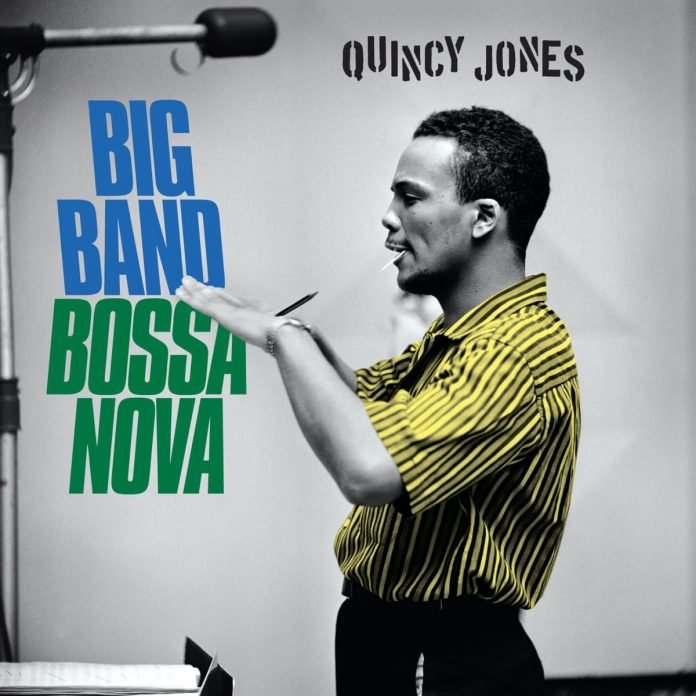Big Band Bossa Nova was recorded seven months after Stan Getz and Charlie Byrd’s trailblazing Jazz Samba. It was probably designed to achieve maximum radio-play because the average playing time is just over three minutes which would have made it popular with disc-jockeys keen to feature “the new thing”.
Quincy Jones’ charts are performed by the cream of New York’s session men although the original LP made no mention of the personnel. 20th Century Masterworks has listed the premier soloists but they would be easily identified by the readers of Jazz Journal and inevitably because of the commercial nature of the date most of the solos are very brief.
The irrepressible Phil Woods is the most heavily featured and he is centre-stage on One Note Samba, Lalo Bossa Nova and Serenata. The happy sound of Clark Terry’s flugelhorn is heard on Boogie Bossa Nova and No More Blues. Paul Gonsalves weaves a delicately serpentine line through Morning Of A Carnival and the melodic Jim Hall has none of the problems on Desafinado that seemed to plague Charlie Byrd on his recording with Stan Getz.
The delightful surprise here is the inclusion of one of Jones’ finest big band dates in its entirety – The Quintessence. Although the notes make reference to it, Quintessence is not mentioned on the CD cover at all which is a strange marketing decision.
Benny Golson’s attractive Little Karen makes its debut here with a powerful solo from Eric Dixon and Straight No Chaser is notable for some fine trombone from the immaculate Curtis Fuller. For Lena And Lennie (dedicated to Lena Horne and Lennie Hayton) is a gentle swinger for Joe Newman in a Harmon-mute with some tasty Basie-like piano from Bobby Scott. Bronislau Kaper’s Invitation from the 1952 film of the same name is introduced by Jerome Richardson’s alto flute with lush backgrounds from the four-man French horn section. Curtis Fuller, Phil Woods and Oliver Nelson are all clearly inspired by the composer’s dramatic theme.
Once again hats off to 20th Century Masterworks for the informative booklet.
Discography
[Big Band Bossa Nova] (1) Soul Bossa Nova; Boogie Bossa Nova; Desafinado; Manha De Carnaval; Forgive Me If I’m Late; On The Street Where You Live; One Note Samba; Lalo Bossa Nova; Serenata; No More Blues; (2) Baia; [The Quintessence] (3) The Quintessence; Robot Portrait; Little Karen; Straight No Chaser; For Lena And Lennie; Hard Sock Dance; Invitation; The Twitch; (4) A Taste Of Honey; Shag Nasty (73.58)
(1) Clark Terry (t, flh); Phil Woods (as); Paul Gonsalves (ts); Roland Kirk (as, stritch); Lalo Schifrin (p); Jim Hall (elg); Chris White (b); Rudy Collins (d); José Paula, Carlos Gomez, Jack Del Rio (pc) and others unidentified. NYC, August, September 1962.
(2) Benny Bailey, Clark Terry, Ernie Royal (t); Curtis Fuller (tb); Julius Watkins (frh); Phil Woods (as); Jerome Richardson, Eric Dixon (ts, f); Sahib Shihab (bar, f); Patti Brown (p); Don Amone (elg); Jimmy Crawford (d); Tito Puente, Carlos Valdes, Michael Olatunji (pc). NYC, February 1961.
(3) Collective personnel: Jerry Kail, Clyde Reasinger, Clark Terry, Joe Newman, Freddie Hubbard (t); Billy Byers, Melba Liston, Paul Faulise, Curtis Fuller (tb); Julius Watkins, Jimmy Buffington, Earl Chapin, Ray Alonge (frh); Phil Woods, Frank Wess (as); Eric Dixon, Oliver Nelson (ts); Jerome Richardson (bar, f); Patti Brown, Bobby Scott (p); Milt Hinton, Buddy Catlett (b); Stu Martin, Bill English, Jimmy Johnson (d). NYC, November, December 1961.
(4) as (1) NYC, June 1962.
20th Century Masterworks 170048















